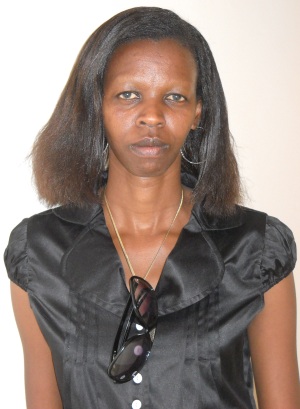
There is sometimes a blurred line between being the author of a criminal act or a victim of unjust circumstances. It takes a perceptive and compassionate legal professional to distinguish between the two. For Mary Katushabe, a Rwandese defense lawyer, the ability to separate a criminal act from an act of desperation is a natural instinct. In countries in which certain fundamental legal norms, such as the presumption of innocence, are not fully internalized, a defender with Mary’s talent is rare.
Mary has been practicing law for less than two years. She has attended two Legal Defense and Human Rights training events hosted by the IBJ Rwanda Program. She has been outspoken in both, never fearing to initiate a debate when judicial expediency is valued over human rights concerns. She has agreed to volunteer with IBJ, and has already taken many cases. It is the dedication of people like Mary that make the work of IBJ possible.
Above: Mary Katushabe – IBJ Rwanda Legal Defender (Photo by Patrick Pratt)
In July, Mary took the case of a young lady, an orphan, who has been accused of infanticide. The young girl, whom we will refer to as Hope, had been taken in by a family after both of her parents died. She fled the household after repeated mistreatment by the adoptive father. After leaving, Hope learned that she was pregnant. She had few people to whom she could turn. Upon approaching the boy whom she claims impregnated her, he denied his involvement in the conception. Prenatal or maternal care for most young girls in such dire situations is widely unavailable in Rwanda. Coupled with poor living conditions and insufficient nutrition, the incidence of miscarriage or premature birth among young girls is high. Young, uneducated, and destitute, Hope had few good options.
To secure a livelihood and stable housing, many young girls in Rwanda undertake domestic work. Hope took employment with another household, yet over time became too weak to perform her duties. She describes the mistreatment she received from the father of the household as worse than she received at her previous residence.
One day, Hope went to the toilet room thinking that she was experiencing digestive pains. As soon as she positioned over the toilet basin, the baby began to come out. Hope claims that when she realized this, she tried to stand up and go outside. In the process, the baby somehow exited and fell into a bucket of water in the toilet room. The baby died, and Hope was arrested shortly thereafter.
The initial charge levied against Hope was abortion. This was later changed to infanticide. Hope has been imprisoned since April, 2008; and made her first court appearance in June, 2010. Mary has taken the case as an IBJ volunteer.
The story of Hope is one of choice and circumstance. She was in one of the most desperate situations in which any young girl can find herself: She has no family, no means, and was then in a situation which would have brought another life into the same circumstances. Hope could depend on no one, and then found herself in the position of having another life dependent upon her. The story of Hope represents the difficult choices people must make and the difficult circumstances with which they must deal.
Above: Mary and her peers at the 2009 IBJ/KBA legal defense training in Kigali. (Photo by Jesse Blaisdell)
Whether the death of the newborn was accidental or intentional, there is no justice as long as Hope is kept behind bars, voiceless, without a trial for two years. Mary is committed to ensuring that people such as Hope are afforded due process under Rwandan Law. And as long as such cases keep justice out of reach of the vulnerable and destitute IBJ will offer its unconditional support to dedicated defenders such as Mary Katushabe.
